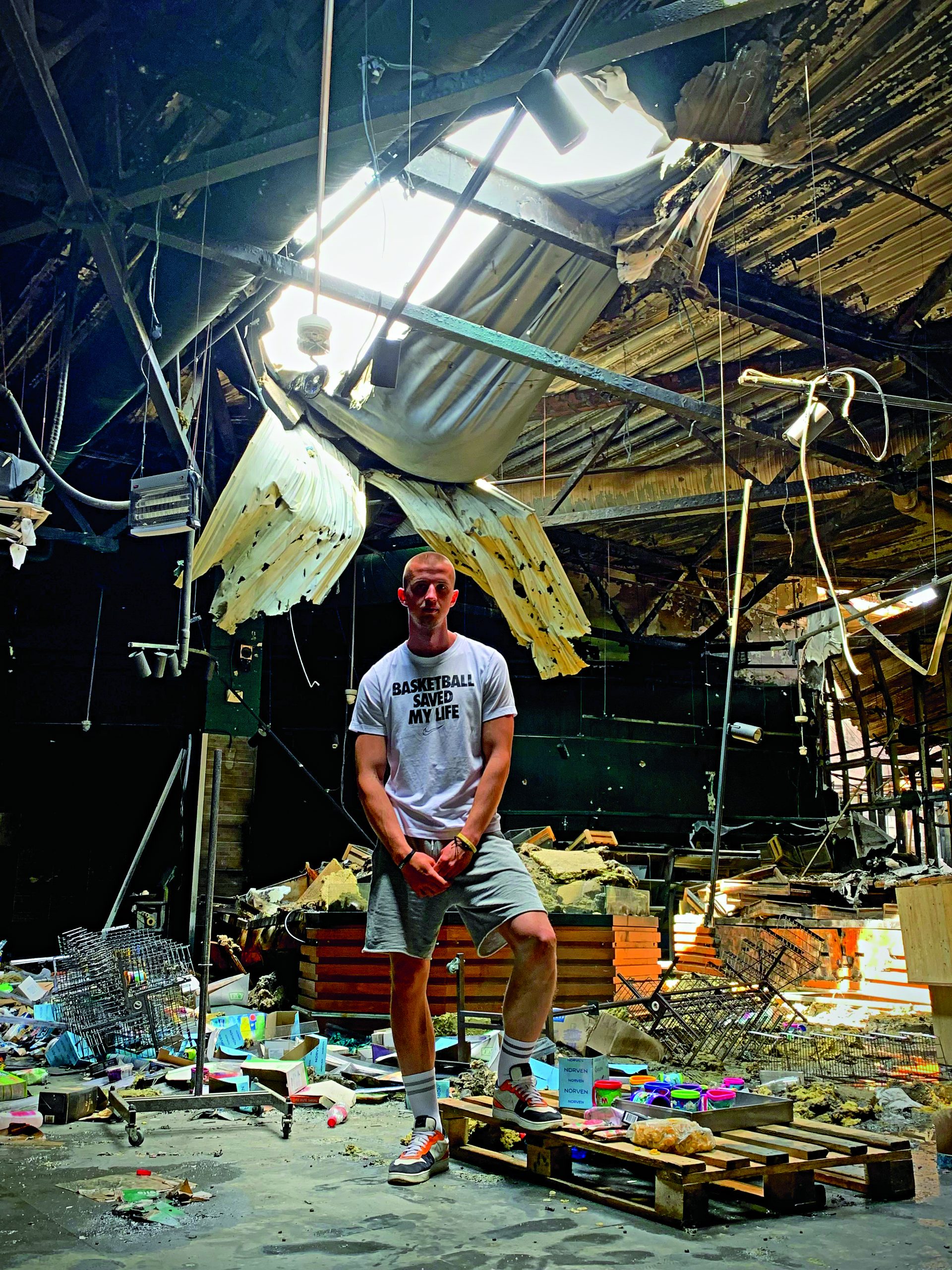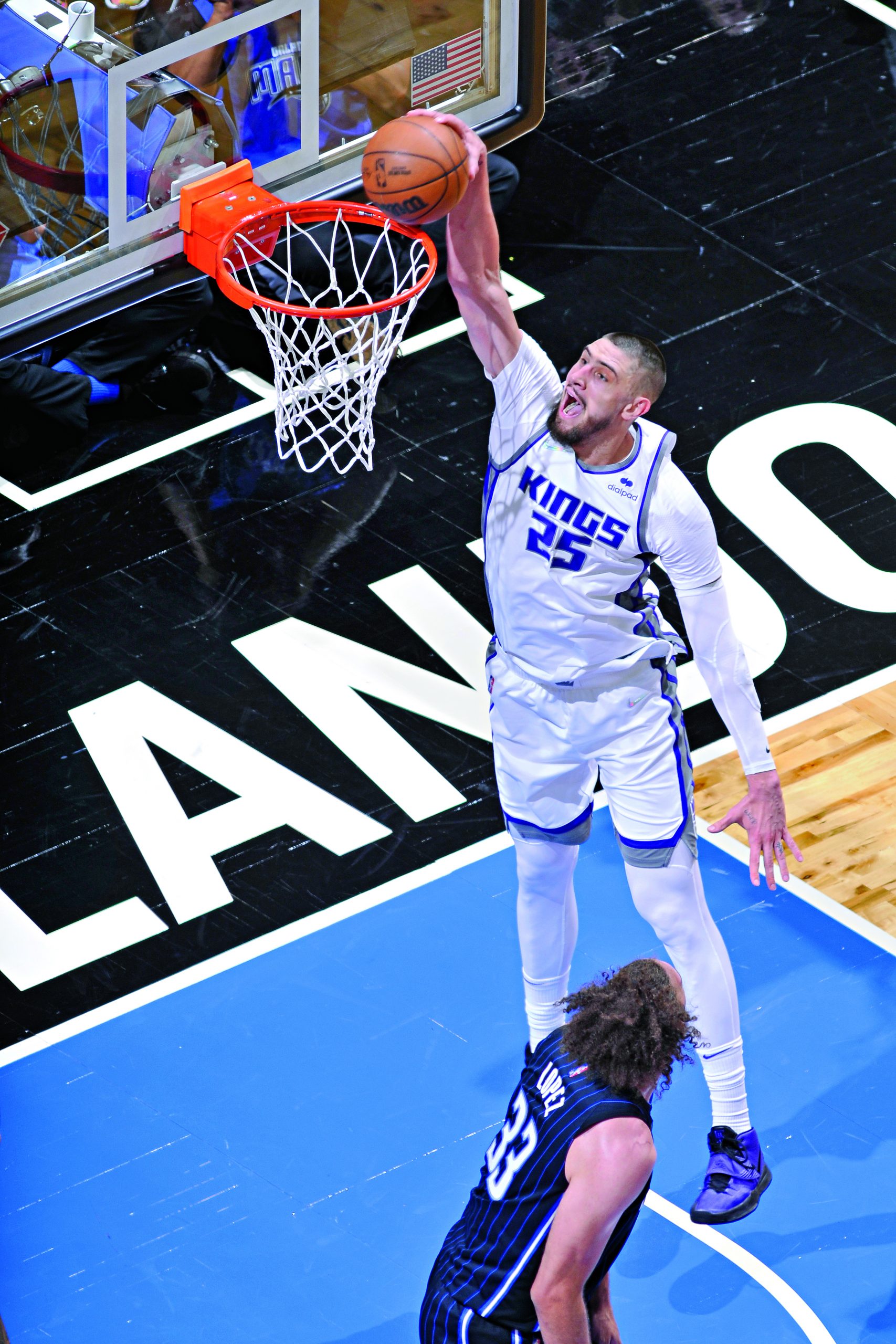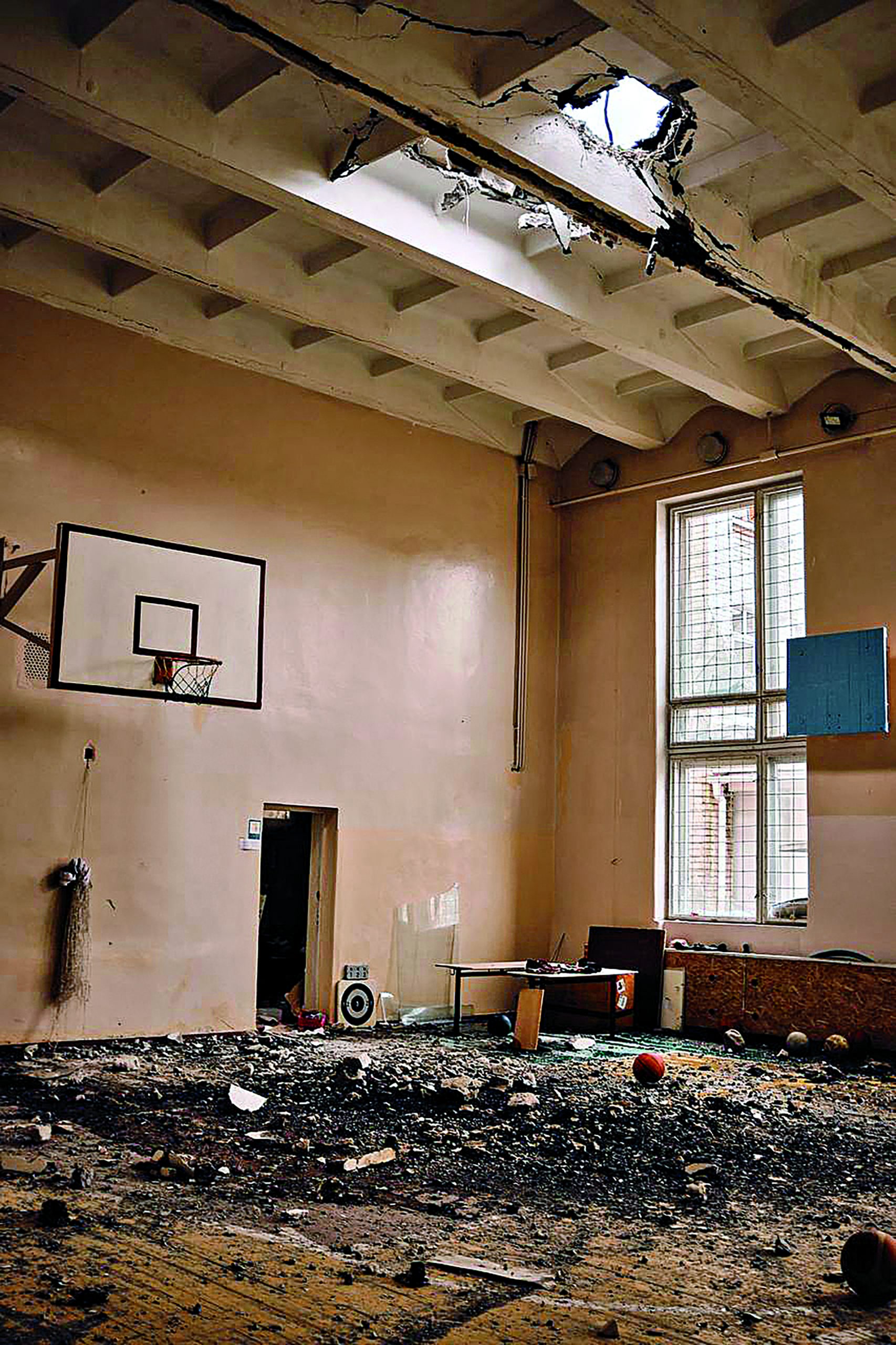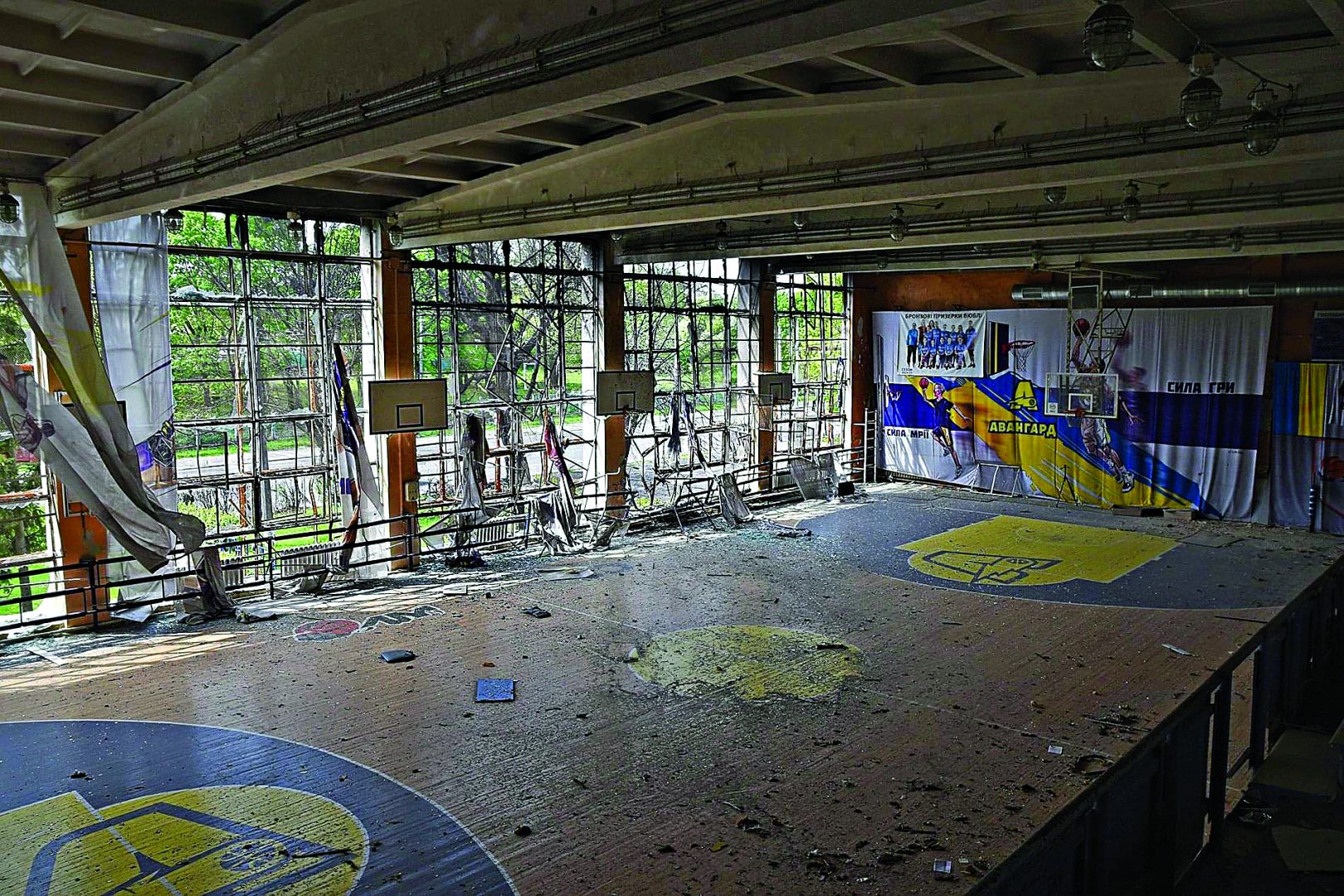In War-Torn Ukraine, these Ukrainian Hoopers are Trying to Uplift Others Through the Power of the Game
This story appears in SLAM 239, which is available now. Shop here.
Valentyn Dubas was sure Russian soldiers were going to kill him. The soldiers were drunk. They detained him and a friend. Had him on his knees in the street with a gun to his head, interrogating him. Dubas insisted he was buying boards to fix windows in his neighborhood in Hostomel, a city northwest of Kyiv, the capital of Ukraine. They called Dubas and his friend homosexuals. They challenged their local knowledge. Dubas could feel their impatience with threats of shooting him in the knee or cutting off his head. All with an AK-47 pointed at his face. Dubas took one last shot at convincing the soldiers to let them go.
“I took a chance and said once again that we are peaceful, we do not need problems, and we do not pose any threat,” he says. “I also said that I am an ordinary teacher at school, and a basketball coach.”
The mood shifted. The soldier removed the AK-47. He picked up Dubas and escorted him away from the others. Dubas thought he was doomed. But the soldier started asking questions.
“Are you really a basketball coach?”
“I say yes,” Dubas recalls. “He started asking me questions about the rules of basketball and the most amazing thing, he asked me to explain how the word ‘basketball’ is translated.”
The soldier said it was Dubas’ lucky day and allowed the two Ukrainians to continue their repairs. Now, Dubas’ Nike t-shirt—purchased a year ago—that reads “Basketball Saved My Life,” is more than a slogan. It’s the truth.

Dubas’ story is just one of millions of stories that could be told since Russia invaded Ukraine. The military invasion launched on February 24, 2022—after a prolonged buildup since 2021—and impacted millions around the country who have fled as refugees or been told to stay and fight. The United Nations has counted over 4.9 million refugees across Europe as of June 9. Ukrainians have felt the mounting possibility of an attack since the annexation of Crimea in 2014. For eastern Ukrainans like NBA player Alex Len and former Arizona Wildcats center Kyryl Natyazhko, these threats have long felt imminent. Len is in the United States, only able to hear and see the carnage second hand, while Natyazhko has been living in Dnipro, a city in central Ukraine. Natyazhko describes civilian life as being a balance of monitoring the news and keeping an evacuation plan in the back of your mind if you live closer to the Russian border.
“My wife and son were packed for about two months just in case,” Natyazhko says. “But none of us really believed that in 2022 that one country would attack another country for not explainable things.”
Still, the invasion was abrupt and unprovoked. Whether prepared or not, people had to mobilize and get to safety quickly. For Dubas, it meant a last minute notice of passage through a green corridor to escape to Kyiv.
“There were eight of us and a beautiful German Shepherd,” he says. “We understood that the chances of getting out alive were 50-50, but still took the risk. We went to Bucha, on the way we saw many dead civilians and evacuation vehicles, just like ours. But we got there.”
For basketball players, professional and amateur, the game and their plans around it stopped. After soccer, basketball is the most popular sport in the country and in the days of the USSR (1922-1991) Ukrainian players were pivotal to the national team’s dominance. Growing up in the city of Antratsyt in eastern Ukraine, Len spoke Russian, and it was not until he went to school in Dnipro that he learned Ukrainian. Len uses terms like “brother countries” to illustrate how shocking the invasion has been.
“I would never in my life think Russia would move in to start a war against basically their own people,” Len says.
Ukrainian professional Dmytro “Smoove” Kryvenko says that while there were warning signs like embassies closing and American players told to return home by the US government, the possibility of war seemed overstated.
“Me and my friends were even joking, trying to plan our next workout,” Kryvenko says. “If there is no war, let’s shoot around tomorrow at 9.”

Photo via @libkos
Kryvenko is an international member of the Harlem Globetrotters and the 2018 FIBA Dunk Contest Champion. He signed to the Globetrotters in 2020 prior to the pandemic and has been unable to join the traveling team, a delay furthered by the war. In February, he signed a contract to play professional 3×3 in India. His flight was booked for March 2. When he returned he would play in the summer season, devote time to his YouTube channel and prepare for the arrival of his first born child.
“Life month[s] prior to the invasion was great,” he says. “Just recently, me and my wife discovered that we are expecting our first child, so we were happy and were planning our future. After February 24, I completely forgot about basketball and was thinking only about how to keep my family safe.”
The couple spent the first week of the invasion in a bomb shelter. They left Obolon, a northern sector of Kyiv, only a day before the shelling and occupation started. They focused on finding gasoline, buying food and an exit plan for his wife—a refugee originally from Luhansk who fled in 2014—her mother and sister to escape to Poland. The family stayed in the western side of the country until they could cross into Poland. Kryvenko says his parents and brother are in Kharkiv, which is 30 km from the frontlines, and extended family is in regions now occupied by Russia. Kryvenko could not leave with his family because all Ukrainian men ages 18 to 61 must remain and await the possibility of enlistment.
As the scale of the invasion increased and the impatience of Russia, who by many reports seemed confident Ukraine would be conquered swiftly, led to heavier air raids, people like Kryvenko, who posts as @smooveukraine, and other social media savvy citizens around the country took to Instagram to present the carnage through a familiar lens that would resonate: basketball.
They connected with photographers who were documenting the wreckage sites, mostly civilian locations that should not be targets of war. They shared images of gymnasiums bombed out, windows shattered, others with massive holes in the ceiling.
“It was the first sign to the whole basketball community that there is no place for ‘sport is not politics’ talks,” Kryvenko says. “After that my friends started to send me a lot of photos and videos from different cities. In Kharkiv, a Russian rocket destroyed half of the university gym where I was playing when I was a student.”

Photo via @tetibond_photo
A cellist named Denys Karachevtsev filmed a performance of “Cherry Blossoms” by The Project Trio seated directly in front of a basketball hoop in Kharkiv. Immediately behind the hoop is the burnt standing remains of a building. Posted to @kharkovcellist, the caption reads: “My one and only native city. My one and only favorite sport.” The performance is transcendent. The video has 100,000 views on Instagram and was shared by American news organizations like ABC News, Reuters, The Washington Post, and The New York Times.
Natalia Yudytska is a 29-year-old citizen of Kyiv. When the invasion began, she had the opportunity to leave Ukraine, but chose to remain. She maintains a PayPal fundraiser on her Instagram. Her account @tasha_shorty has just over 470 followers, but many of her followers are Americans who love and primarily share basketball content. She said it was the March 1 bombing that destroyed Avangard pavillion, a hallmark of basketball in Kyiv, that hit the basketball community especially hard.
“That place had a great value to many hoopers in Kyiv,” she says. “Then I realized that basketball communities all over the world should see all the horrors of this war. There are so many destroyed basketball halls and courts in Ukraine and sometimes they make more impression on people than the news reports.”
For Alex Len, Avangard is where he had his first in-game dunk. But it was not just Avangard— the gym in Kyiv where the national team trained since 2013 was also bombed. A year ago, Len got a hand tattoo of the official coat of arms of Ukraine, a trident meant to symbolize Ukrainian warriors of the past protecting the sovereignty and territorial integrity of Ukraine today. He was on All-Star break last February when the escalation began. He tried to convince his family to evacuate early, selling it as a family vacation to Turkey, but they wanted to remain.
“The day of the [February] 24th, I probably had maybe 200 plus messages,” he says.

That night, before tip-off of a home game in Sacramento’s Golden 1 Center against the Denver Nuggets, the two teams stood at center court with arms locked for a moment of silence and solidarity for Ukraine. Above them the screen was black with the words “ні війні No War” in bold white font. Much like his countrymen in Ukraine, Len’s mind was not on basketball. He remained with the Kings. Dressed for games. Used practice and workouts as opportunities to clear his head, but emotional weight and bad news back home kept coming.
As the only two Ukrainians in the NBA, Len and Svi Mykhailiuk of the Toronto Raptors focused on mutual aid with the Hope For Ukraine Fund. The Kings made a donation, and Len said he’s had support from his teammates, coaches and other players around the League. He was surprised to receive calls from Bosnian NBA player Jusuf Nurkic and Italian pro Danilo Gallinari asking to help. The Hope For Ukraine Fund is helping to give support for refugees, medical and humanitarian aid, and in the long term, rebuilding sports infrastructure.
“Everybody back home is saying humanitarian help is good, but it’s more needed for the army,” Len says.
Life during wartime is not all combat. Ukrainian pro Kyryl Natyazhko hasn’t thought about or picked up a basketball since February. He has been using his connections from playing in Lithuania and Poland to obtain vehicles for the military. He takes the train from his home in Dnipro to the border where he acquires pick-up trucks and jeeps, which he loads with donated water and food. He’s done the trip 10 times. It’s a dangerous journey because the Russians target trains to cut supply lines. Then he’s driving close to the front lines for the drop off. So close that he once saw a helicopter shot down.
“I think, you know, we started now to understand as a country not all war is on the front line,” he says. “There is a war to be fought in the back as well.”
He stressed the importance of social media to the war. Not just by Ukrainians telling the story from the inside, but also by keeping the awareness and engagement active around the world.
“They wait for the noise to go down,” he says of Russia. “So they can do the stuff they want to do. As the time moves on, we become stronger because we have support from all over the world. They become weaker, because no one wants to support evil. It’s like a game. We wear them out and wear them out.”
Part of that fight is protecting their ways of living before war time, a way of keeping a better future in sight. Natyazhko encourages artists and musician friends to use their talents to let the troops know they are supported, to let them know what they are fighting for. In April, while staying in Ivano-Frankivsk, Kryvenko was invited to participate in a kids basketball camp. He was surprised to learn that many of the children were refugees from eastern Ukraine and Kyiv. Kryvenko asked if they really want to watch basketball right now.
“They said of course!” he says. “And I understood that life continues no matter what, especially for kids. While adults are deep into news, into real problems, what to do next, where to live, where to earn money, kids continue to live their life.”
It reminded him of his own childhood, which he remembers as carefree and full of playing basketball with friends, but his parents were struggling through the post-USSR period.
The UN reports there have been 2.3 million “cross border movements” back into Ukraine as Russian forces have been pushed back from Kyiv and closer to the original borders in the East and South. Yudytska says in Kyiv she’s been able to enjoy simple pleasures again after months of living with the uncertainty that any day could be her last. That means visits to her favorite coffee shop and trips to the park to hoop.
“Basketball is my medicine,” she says. “It helps me to get a little distraction from the horrors that are happening daily in my country. I’m so happy I have the opportunity to play again.”
Action Photo via Getty Images.

